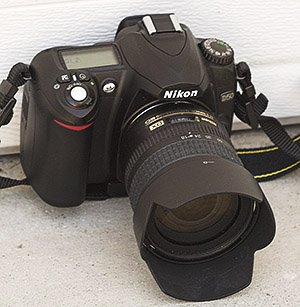
Camera phones change how we interact with the world, Steven Barrie-Anthony writes in the LA Times.
This is something I've thought about a lot, though I don't have a camera phone -- and can't imagine having one unless they improve a lot because I am too much of a snob about image quality.It's difficult to imagine Robert Frost, say, stopping in the woods on a snowy evening, giving his harness bells a shake with one hand while holding a camera phone with the other, and still taking in enough of the experience to conjure it later in verse. Another poet could write from Frost's photo record, although whose woods those were he might not know...
For years I didn't choose to use a camera, except rarely. I wanted to be sure that I lived my experiences fully rather than turning them into pictures.
I've always known how to capture photos that would enable me to tell a story. When we worked in South Africa for anti-apartheid newspapers, knowing that we'd have to try to explain back home, I snapped images with a slide show in mind. I came away with a usable story.
My first digital camera changed my relation to the world. Because I did not have to develop a lot of bad pictures in order to find a few good ones, photography became my art form, a delight in its own right. A better camera has made me a photographing fanatic.
At this time, I'm not interested in video -- I don't know how to tell stories in that medium. I'm not sure I want to. Maybe soon that reluctance will seem dated -- a little like Frost creating a poem out of a remembered experience.
This blog seems on its way to becoming as much a venue for my picture stories as for my thoughts. I'm fine with that.
2 comments:
You left out the most exciting detail about digital cameras. For the entire twentieth century, good photography really was the province of the wealthy or at least the comfortable middle class because everything associated with it was so expensive (cameras, paper, chemicals, darkroom equipment).
That's no longer the case. I did a photo project in 2001 where I tried to capture the world around me in anywhere from 20 to 200 digital photos a day. After rigorous editing (the most important part, fellow photographers), cropping and adjusting levels in Photoshop every night, I'd pick out the best and create a daily "FotoTale" about what had been captured visually.
Eventually, I took the 365 discrete slide shows, edited them again, and put them onto video with "sampled" music over 52 half-hour episodes. You may have seen it on Channel 29 where it played during 2003 and 2004.
In any case, the real point is that project would have cost literally millions of dollars to create twenty years ago, and I did it for about five thousand dollars, if you include computers, camera, memory sticks and videotapes.
We live in amazing times for self-publishing.
Mike, that is so awesome. Yes -- it is about the ability to do this so cheaply!
I was on your Civic Center turf today and posted about it just above. :-)
Post a Comment